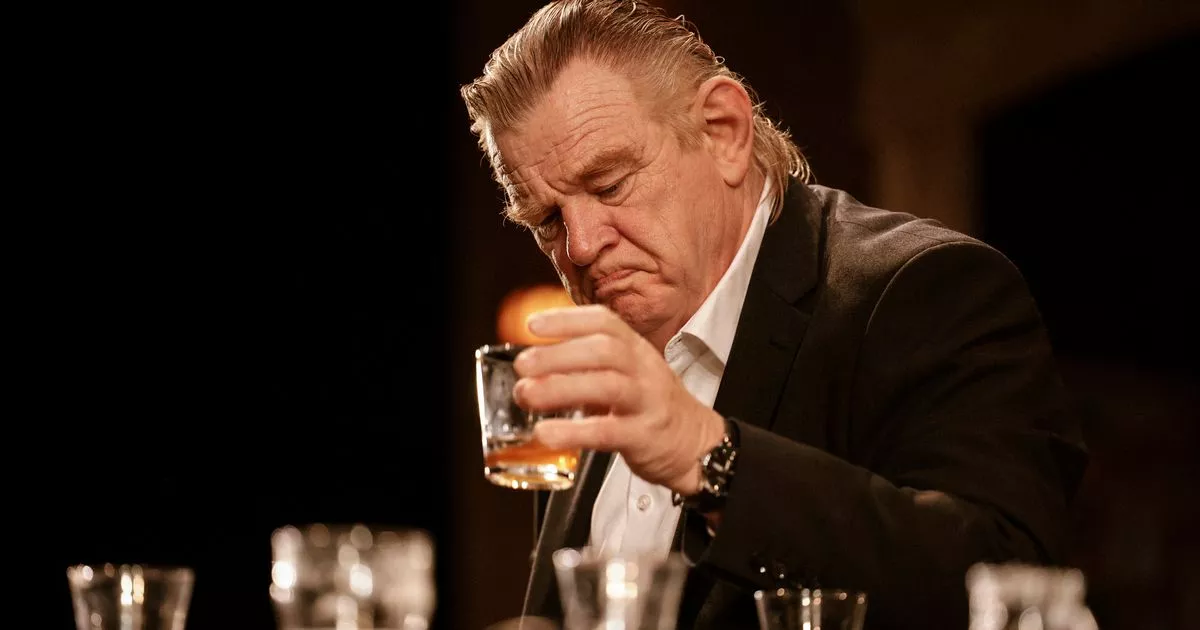By Neil Leslie
Copyright irishmirror

Among the list of presidential hopefuls we would like to have seen, Brendan Gleeson would have been close to the very top.
I have only encountered him in the flesh twice.
Once was on a St Patrick’s Day in Hughes Pub near Dublin’s Four Courts. He was furiously fiddling in the middle of a trad session in the jam-packed bar.
As I watched him, two women elbowed their way past me for a glimpse of the great man, one having clearly told the other there was a Hollywood legend on the premises.
On clapping eyes on Gleeson, the second woman rolled her eyes and chided her pal: “You feckin’ eejit, that’s not Liam Neeson.”
My second time seeing the Dublin actor in the flesh was earlier this month as he starred in the Olympia Theatre’s extraordinary production of Conor McPherson’s play ‘The Weir’.
Acting alongside heavyweights like Sean McGinley and Tom Vaughan Lawlor, Gleeson is the mesmeric heart of the story.
He plays a rural bachelor passing a cold Leitrim night in the company of his local pub and a group of friends.
Gleeson towers over everything with the exception of the words and stories that make up McPherson’s masterpiece.
It is an aching study of loneliness and connection in the kind of isolated places that make up much of the fabric of Irish life.
While there are just five actors on stage, the world ‘The Weir’ conjures into life fills the old theatre with many more ghosts.
There are the long-gone neighbours, the lost children, the old wives and their tales of strange happenings in graveyards and on faerie roads.
Gleeson delivers one of the central tales of love lost, enthralling the assembled motley drinkers – and the audience – with the story of how his life took a fork towards the existence of the lonely country bachelor.
Watching him, drink in hand, in a set that recreates the hearth of a rural pub on a dark Irish night, there is a sense that another unexpected ghost has joined the cast since the play was first staged.
As the actors leave and the lights decline, we are left with a final frame of the rural pub scene itself.
In the almost 30 years since McPherson wrote ‘The Weir’ over 2,000 of these same real-life settings have become ghosts.
That’s one in four of the pubs like the one that pulls the cast of characters in the Weir from their lonely lives into a community of the living.
In some parts of rural Ireland the death spiral has been even steeper.
In Leitrim where McPherson’s characters were inspired by visits to his grandfather, there were 140 pubs in 2005. Today there are 100.
Across Ireland, 2,119 closed between 2005 and 2024. No one even has the figures for the others that now only open for part of the week.
Many will be the kind of places depicted in the play, the third spaces that keep out loneliness with the wind.
Where the likes of Sean McGinley’s ‘Jim’ listens with a sixth sense to the faintest noise of an approaching car, confidently predicting the identity and impending arrival of its owner by the fingerprint of sound as its moves through the local air.
Many of Ireland’s shuttered pubs have passed their alcohol licenses to nearby convenience stores and petrol station off licenses. And way too many of the approaching cars are now those of locals buying a bottle to go home and drink alone.
A recent academic report commissioned by the Drinks Industry of Ireland notes the reality of that cold data: “Behind every closure statistic is a devastating loss for a local community. For countless villages and rural areas, the pub is the primary hub for social gathering, the place where neighbours connect and local events are hosted.
“The loss of these businesses, many of them family-run for generations, creates a vacuum that damages the social fabric of communities and deepens the risk of rural isolation. This trend has reshaped communities and promoted social disconnection.”
It doesn’t feel like a coincidence that another report recently revealed anyone who does find an open rural pub will pay 11 times the rate of excise for a pint than drinkers in Germany.
The State takes an average of €1.67 from a pint of stout, effectively taxing the kind of communal connection celebrated by Gleeson and his co-stars in the Weir.
Compare this to France where they have introduced up to €80,000 in financial supports to help bars re-open in their rural communities.
Studies have found western nations face an epidemic of solitude as the “attention economy” draws us ever deeper into a virtual unreality.
Loneliness itself has been made a health priority of the European Commission. It can cost health systems an estimated €2,000 per patient whose disconnectedness from society results in a spiral of mental and physical health problems.
In the US loneliness costs the economy an estimated €460 billion.
For centuries on this windswept island, the local pub has been our equivalent of the sun-splashed European piazza where the old gather of an evening.
It is even under consideration for UNESCO world heritage status.
I don’t know if Jack Chambers and Pascal Donohoe are theatre fans. But had they seen Gleeson’s haunting performance in the Weir maybe it would have given them pause for thought.
They are expected to deliver a VAT cut that will be enjoyed by major hospitality chains serving food in next month’s budget. But that won’t help Tony Holohan’s old nemesis “the Wet Pub”.
What would help those small rural locals would be the cut of 10 percent being called for in the punitive excise rate charged on the old men ordering their pints and their small ones.
Of the 6,000 pubs that remain in Ireland, another 1,000 will bring down the shutters before theatres are staging 40th anniversary productions of the Weir.
If any of them are starring Brendan Gleeson I recommend going along. Unfortunately there’s no chance of recreating my encounter with him in Hughes pub. The last person out switched off its lights in 2021.
Subscribe to our newsletter for the latest news from the Irish Mirror direct to your inbox: Sign up here.



